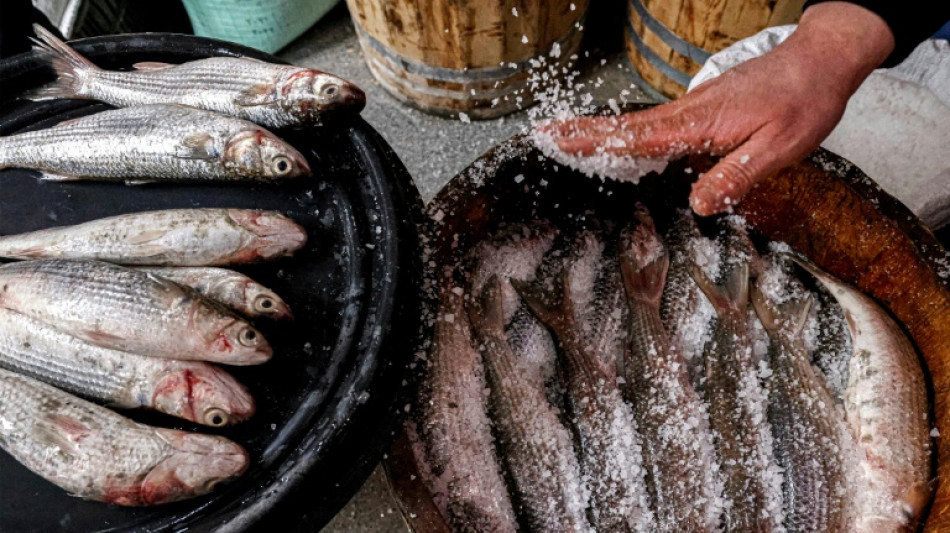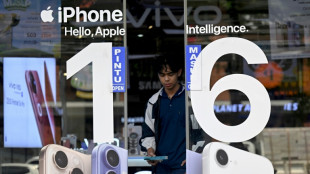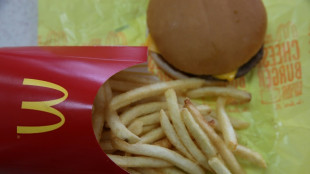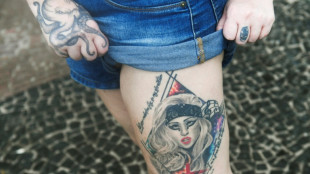
-
 Apple expects $900 mn tariff hit as shifts US iPhone supply to India
Apple expects $900 mn tariff hit as shifts US iPhone supply to India
-
US to end shipping loophole for Chinese goods Friday

-
 Forest's Champions League dreams hit by Brentford defeat
Forest's Champions League dreams hit by Brentford defeat
-
Norris and Piastri taking championship battle in their stride

-
 Chelsea close in on UEFA Conference League final with win at Djurgarden
Chelsea close in on UEFA Conference League final with win at Djurgarden
-
Spurs take control in Europa semi against Bodo/Glimt

-
 Man Utd seize control of Europa League semi against 10-man Bilbao
Man Utd seize control of Europa League semi against 10-man Bilbao
-
With minerals deal, Ukraine finds way to secure Trump support

-
 Amazon revenue climbs 9%, but outlook sends shares lower
Amazon revenue climbs 9%, but outlook sends shares lower
-
Trump axes NSA Waltz after chat group scandal

-
 Forest Champions League dreams hit after Brentford defeat
Forest Champions League dreams hit after Brentford defeat
-
'Resilient' Warriors aim to close out Rockets in bruising NBA playoff series

-
 US expects Iran talks but Trump presses sanctions
US expects Iran talks but Trump presses sanctions
-
Baffert returns to Kentucky Derby, Journalism clear favorite

-
 Top Trump security official replaced after chat group scandal
Top Trump security official replaced after chat group scandal
-
Masked protesters attack Socialists at France May Day rally

-
 Mumbai eliminate Rajasthan from IPL playoff race with bruising win
Mumbai eliminate Rajasthan from IPL playoff race with bruising win
-
McDonald's profits hit by weakness in US market

-
 Rio goes Gaga for US singer ahead of free concert
Rio goes Gaga for US singer ahead of free concert
-
New research reveals where N. American bird populations are crashing

-
 Verstappen late to Miami GP as awaits birth of child
Verstappen late to Miami GP as awaits birth of child
-
Zelensky says minerals deal with US 'truly equal'

-
 Weinstein lawyer says accuser sought payday from complaint
Weinstein lawyer says accuser sought payday from complaint
-
Police arrest more than 400 in Istanbul May Day showdown

-
 Herbert named head coach of Canada men's basketball team
Herbert named head coach of Canada men's basketball team
-
'Boss Baby' Suryavanshi falls to second-ball duck in IPL

-
 Shibutani siblings return to ice dance after seven years
Shibutani siblings return to ice dance after seven years
-
300,000 rally across France for May 1, union says

-
 US-Ukraine minerals deal: what we know
US-Ukraine minerals deal: what we know
-
Top Trump official ousted after chat group scandal: reports

-
 Schueller hat-trick sends Bayern women to first double
Schueller hat-trick sends Bayern women to first double
-
Baudin in yellow on Tour de Romandie as Fortunato takes 2nd stage

-
 UK records hottest ever May Day
UK records hottest ever May Day
-
GM cuts 2025 outlook, projects up to $5 bn hit from tariffs

-
 Thousands of UK children write to WWII veterans ahead of VE Day
Thousands of UK children write to WWII veterans ahead of VE Day
-
Top Trump official exiting after chat group scandal: reports

-
 Madrid Open holder Swiatek thrashed by Gauff in semis
Madrid Open holder Swiatek thrashed by Gauff in semis
-
Sheinbaum says agreed with Trump to 'improve' US-Mexico trade balance

-
 US veteran convicted of quadruple murder to be executed in Florida
US veteran convicted of quadruple murder to be executed in Florida
-
UK counter terrorism police probe Irish rappers Kneecap

-
 S. Korea crisis deepens with election frontrunner retrial, resignations
S. Korea crisis deepens with election frontrunner retrial, resignations
-
Trump administration releases report critical of youth gender care

-
 IKEA opens new London city centre store
IKEA opens new London city centre store
-
Police deploy in force for May Day in Istanbul, arrest hundreds

-
 Syria Druze leader condemns 'genocidal campaign' against community
Syria Druze leader condemns 'genocidal campaign' against community
-
Prince Harry to hear outcome of UK security appeal on Friday

-
 Microsoft raises Xbox prices globally, following Sony
Microsoft raises Xbox prices globally, following Sony
-
US stocks rise on Meta, Microsoft ahead of key labor data

-
 Toulouse injuries mount as Ramos doubtful for Champions Cup semi
Toulouse injuries mount as Ramos doubtful for Champions Cup semi
-
Guardiola glad of Rodri return but uncertain if he'll play in FA Cup final


Nile-side Egypt town heralds spring with pungent delicacy
The overwhelming smell may be misleading, but the Egyptian town of Nabaruh, its streets lined with shops selling salty, fermented fish called feseekh, is far from the seaside.
Landlocked in the Nile Delta, "Nabaruh is the capital of feseekh," boasted 44-year-old Sherif al-Yamani, owner of one of the town's famed shops.
The millennia-old delicacy of saltwater fish, buried in salt for weeks at a time, remains a staple as Egyptians celebrate on Monday the ancient spring festival of Sham al-Nessim.
But it is as acclaimed as it is divisive, pitting those who complain of the pungent odour against others gleefully marrying feseekh with flatbread and spring onion.
The traditional dish dates back more than 4,000 years and has been found in archaeological sites in Egypt, said former antiquities minister Zahi Hawass.
"Ancient Egyptians used to salt fish to extend its shelf life so workers could continue to eat it as they built the pyramids," he said.
Karim Abdel Gawad drove from a neighbouring province, Gharbia, to buy the fish in Nabaruh where "it's really something else", he told AFP.
"There's no room for experimenting with feseekh, you need to get it from somewhere you trust."
Yamani takes pride in coming from one of a handful of feseekh-making families that began curing fish a century ago, making a name for their town.
"Whether or not it's the holiday season, we're always getting customers from all over Egypt," he told AFP, serving a client who had come from the capital Cairo, some 120 kilometres (75 miles) to the south.
- Smell of success -
The ancient craft is delicate. One wrong move -- too much moisture in the fish, not enough salt in the barrel -- and a bad feseekh might cause botulism, as Egypt's health ministry annually warns ahead of Sham al-Nessim.
"It all comes down to how the fish is prepared," which is why it should never be bought from open-air markets or street vendors, Yamani said.
With a careful eye to catch any error, he supervised his workers as they piled fish into large wooden barrels, each layer separated by a thick coat of coarse salt.
After each barrel is sealed with plastic, a fresh heap of salt is piled on top, locking everything in for the pungent smell to brew for weeks.
The spring festival, celebrated on the Monday after Easter in the Coptic Orthodox calendar, falls this year during the Muslim fasting month of Ramadan.
For those fasting from sunrise to sunset, consuming the salty dish could make them unbearably thirsty the following day. Many got their fill the week before Ramadan, Yamani said.
But love for feseekh seems to transcend hydration concerns, as clients continued to come in and out of the small shop even during the holy month, which is set to end next week.
And even a sharp economic crisis impacting every facet of Egyptian life over the past year -- with inflation hitting 33.9 percent in March -- has not stopped locals from getting feseekh at a price of about 220-240 pounds ($7-8) per kilo.
"We didn't imagine we'd be selling this much, but it seems like feseekh purchases haven't been affected," the fishmonger said.
Th.Berger--AMWN